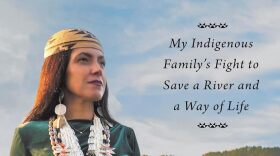-
William Logan Hebner tells Joan Cordova about his experience with a supernatural vision and how it has affected his outlook. They share their thoughts on silence, nature, and perception.
-
Larry Morris recounts the 19th-century experience of the Arikaras, Crows, Cheyennes, and Arapahos by detailing their interactions with four legendary survivors of a fight with the Arikaras in 1823.
-
We talk with Amy Bowers Cordalis about her new book "The Water Remembers: My Indigenous Family's Fight to Save a River and a Way of Life."
-
With a $2 million construction grant currently on hold, Energize Wind River is searching for other funding sources to make solar a reality for some Eastern Shoshone homes.
-
Of particular concern was a late January Office of Management and Budget memo that temporarily froze federal payments, and sowed ongoing uncertainty across the country.
-
The U.S. Forest Service is spending another $20 million to remove flammable underbrush and logs from forests to reduce wildfire risk. Some of the funding will be used to turn that timber into firewood.
-
Navajo family farms once lined the San Juan River in southeast Utah, but many have fallen idle. A water rights settlement with Utah has given some Navajo residents hope those farms can return.
-
Aired Sept. 4. In 2012, Matika Wilbur sold everything in her Seattle apartment and created Project 562 to photograph all 562+ Native American sovereign territories in the U.S.
-
The 2024 Sundance Institute held an Indigenous film tour in June that traveled through multiple states and featured eight short films from across the world.
-
Murals painted by teachers and students at the former Intermountain Indian School in Brigham City have been preserved and will be on display next year at the Nora Eccles Harrison Museum of art.

Play Live Radio
Next Up:
0:00
0:00
Available On Air Stations









